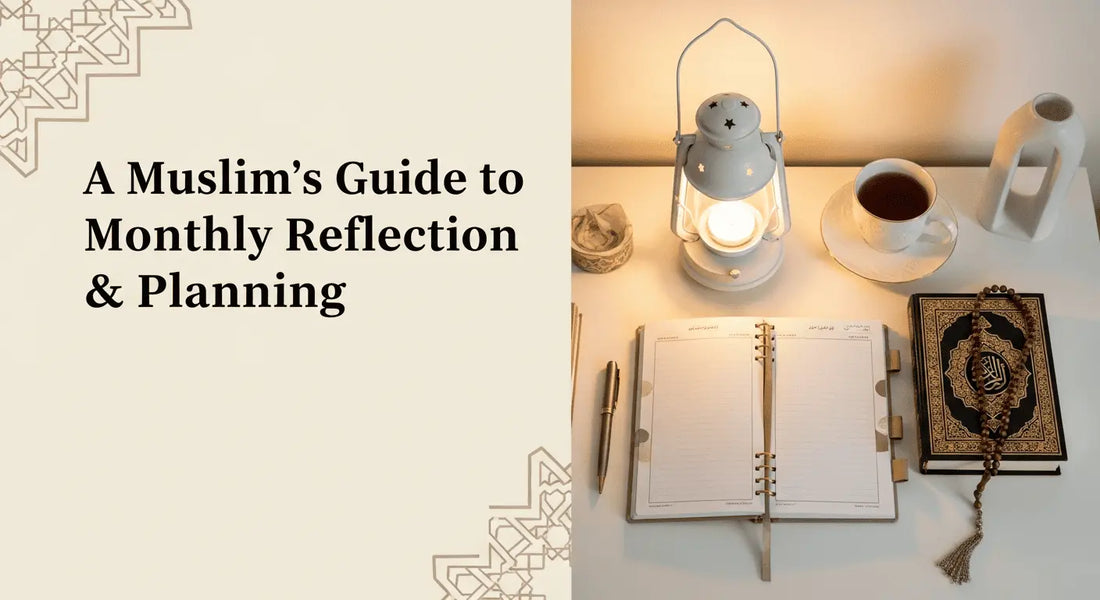
A Muslim’s Guide to Monthly Reflection & Planning
Share
Introduction
Monthly reflection is a powerful habit encouraged in Islam. The Qur’an and Sunnah consistently remind us to practice muhasabah—self-accountability—as a way to improve both our spiritual and worldly life. As Allah ﷻ says:
“O you who have believed, fear Allah. And let every soul look to what it has put forth for tomorrow—and fear Allah. Indeed, Allah is Acquainted with what you do.” (Qur’an 59:18, quran.com)
In modern times, one effective way to practice this is by using an Islamic monthly planner. Unlike standard planners, it helps Muslims track salah, Qur’an recitation, personal goals, and family responsibilities while staying aligned with Islamic values.
This guide will walk you through the importance of reflection in Islam, the structure of a monthly Islamic planner, and practical tips for setting faith-based goals that bring barakah into daily life.
Why Reflection Matters in Islam
Self-reflection is not just a productivity tip—it’s a Qur’anic command. Umar ibn Al-Khattab رضي الله عنه famously said:
“Take account of yourselves before you are taken to account.”
This practice of muhasabah helps Muslims review their deeds, identify shortcomings, and strive toward improvement. The Prophet Muhammad ﷺ also emphasized daily reflection as a means of strengthening one’s faith and character.

For a deeper look at self-control and accountability, see our guide on Self-Discipline in Islam.
What Is an Islamic Monthly Planner?
An Islamic monthly planner is a faith-based tool designed to balance Deen and Dunya. Unlike regular planners, which focus only on productivity or scheduling, an Islamic planner integrates worship, spirituality, and personal growth.
It allows Muslims to:
- Track salah, Qur’an, and dhikr.
- Record gratitude and reflections.
- Plan work, studies, and family duties.
- Set monthly Islamic goals that align with barakah-driven intentions.
This makes it a holistic approach to organizing life while staying mindful of Allah.
Core Elements of a Monthly Islamic Planner

Spiritual Goals Section
-
Salah tracker for consistency.
-
Qur’an reading schedule (daily or weekly).
-
Dhikr goals to strengthen remembrance.
Related: Muslim Prayer Planner (coming soon).
Productivity & Habit Tracker
-
Recording Sunnah habits such as fasting Mondays & Thursdays.
-
Daily routines for time management.
-
Balancing productivity with rest.
Personal Development & Reflection
- Journaling for gratitude (shukr).
-
Monthly review prompts: “What went well this month? What needs improvement?”
Read: Benefits of Gratitude Journaling in Islam.
Dunya Responsibilities
- Work schedules, study commitments, and family planning.
- Setting priorities without compromising worship.
How to Do Monthly Reflection as a Muslim

Reflection at the end of each month helps Muslims remain grounded and intentional. Here’s a simple method:
- Review ibadah performance – Salah, Qur’an, dhikr, fasting.
- Track achievements – Note spiritual and worldly successes.
- Identify growth areas – Where did laziness or procrastination take over?
- Re-align intentions – Write goals for next month with Islamic values in mind.
- Make dua – Ask Allah for istiqamah (steadfastness).
This structured process turns reflection into an act of worship.
Setting Monthly Islamic Goals
Goals give direction to our efforts. An Islamic monthly planner provides space to create meaningful objectives:
- Spiritual Goals: Improve salah consistency, memorize one surah, increase sadaqah.
- Character Goals: Practice patience, express gratitude daily, improve honesty.
- Dunya Goals: Dedicate time to studies, manage work deadlines, nurture family ties.
With monthly Islamic goals, Muslims can balance both worlds while aiming for Allah’s pleasure.
Example Layout of an Islamic Monthly Planner
A typical Islamic monthly planner includes:
- Salah & Qur’an tracking tables.
- A gratitude and reflection journal.
- Monthly review page with questions.
- Productivity & work task lists.
- Family and social commitments section.
Ready to get started? Explore the Muslim Planner, designed to guide you through Deen and Dunya.
Benefits of Using an Islamic Planner
Using a planner rooted in Islamic principles brings multiple benefits:

- Spiritual Growth: Keeps you accountable in worship.
- Time Management: Structure your day with salah as the anchor.
- Barakah in Life: Gratitude and planning invite divine blessings.
- Balanced Living: Ensures Deen is not neglected while pursuing Dunya.
Faith-based planning is more than productivity—it’s a means of drawing closer to Allah.
Monthly Reflection Tips for Muslims
To make reflection a lasting habit:
- Choose consistency over perfection—start small.
- Use Qur’anic duas like Rabbana taqabbal minna in your journaling.
- Reflect with your spouse or family to encourage shared growth.
For deeper insights, read How the Muslim Planner Helps You Balance Deen & Dunya.
Conclusion
An Islamic monthly planner is more than just a tool—it’s a lifestyle shift. By combining worship tracking, goal setting, and self-reflection, Muslims can strengthen their iman, improve productivity, and live with more barakah.
Monthly reflection is a powerful practice that helps Muslims evaluate their progress in worship, personal goals, and overall productivity. By setting aside time each month to review what went well and what needs improvement, you create a clear path for growth with intention. If you’d like personalized guidance on how to structure your monthly reflections using the Muslim Planner, you can reach out to us here.
Start small, stay consistent, and seek Allah’s help in every step.
Begin your journey today with the Muslim Planner.
FAQs
Q1: What makes an Islamic monthly planner different from a regular planner?
Unlike regular planners, an Islamic monthly planner integrates salah, Qur’an reflections, and spiritual accountability alongside productivity tools.
Q2: How can Muslims use monthly reflection to grow spiritually?
Monthly reflection helps Muslims practice muhasabah, set intentions, and stay accountable in both ibadah and daily responsibilities.
Q3: Can an Islamic monthly planner improve productivity?
Yes. By combining faith-based accountability with practical time management, it helps Muslims balance worship, personal development, and worldly tasks.


